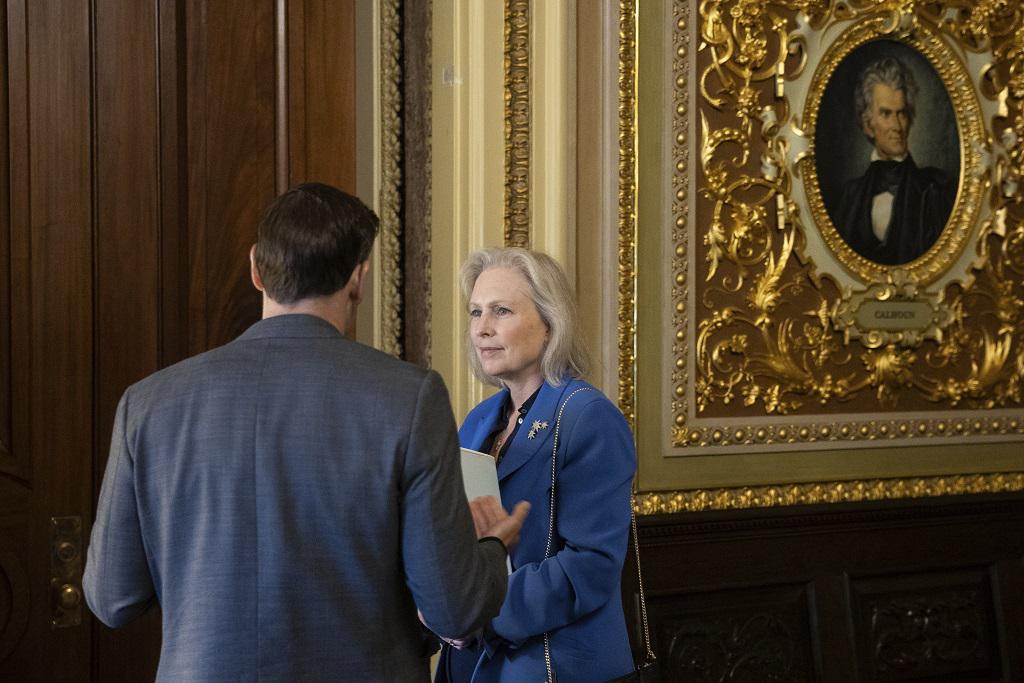It’s official. As my colleague David Dayen and I both predicted, enough Democratic senators have voted for a crypto “regulation” bill (called the GENIUS Act), basically written by the industry and Donald Trump’s minions, that it passed easily on Monday. If anything, it was even worse than I expected—just nine Democrats were needed to get to the necessary 60 votes, but 16 voted for it. (Two Republicans, Sens. Rand Paul of Kentucky and Jerry Moran of Kansas, voted against it.)
This vote was technically for cloture, meaning the bill couldn’t be halted by a filibuster, but it’s the only vote that mattered. The official vote, now scheduled for Thursday, is only a formality, and I expect several of these senators to vote against it so they can pretend they aren’t monumentally corrupt.
The Crypto Sixteen are the following: Kirsten Gillibrand (D-NY), who co-sponsored the bill, Adam Schiff (D-CA), Angela Alsobrooks (D-MD), Mark Warner (D-VA), Ruben Gallego (D-AZ), John Fetterman (D-PA), Cory Booker (D-NJ), Catherine Cortez Masto (D-NV), Ben Ray Luján (D-NM), Elissa Slotkin (D-MI), Maggie Hassan (D-NH), Martin Heinrich (D-NM), Jon Ossoff (D-GA), Alex Padilla (D-CA), Jacky Rosen (D-NV), and Lisa Blunt Rochester (D-DE). Every one of them ought to be primaried in their next election.
Sen. Elizabeth Warren (D-MA), who has more experience in financial regulation than anyone in Congress, outlined the problems in a speech on the Senate floor. First, the bill gives a clear green light to Trump’s world-historical corruption. “Passing this bill means that we can expect more anonymous buyers, big companies, and foreign governments to use the president’s stablecoin as both a shadowy bank account shielded from government oversight and as a way to pay off the president personally. For crooks, it’s a two-for-one,” she said.
Second, it would greatly destabilize the financial system by allowing crypto stablecoins (that is, crypto assets supposedly pegged to the dollar and backed with real assets) into it without real regulations or protections. As Warren points out, we have seen in the past, with the financial derivatives that led to the 2008 crash, that a weak regulatory bill is worse than no bill at all. The powers of the various regulatory authorities are not clarified at all, and in any case, with Trump tearing these agencies to shreds, it wouldn’t matter if they were. Another crypto crash will come, but this time it might take down Wall Street with it.
Third, it would greatly enable criminal activity of all kind. Stablecoins are already the currency of choice for everyone from human traffickers to drug cartels to terrorists, and the bill would inflate the size of the stablecoin market by perhaps tenfold. Unbelievably, new language inserted only last weekend allows stablecoins that are not in compliance with American legal rules to circulate domestically. One wonders if “El Chapo” Guzman was involved in drafting this delightful provision.
Fourth, it would allow companies to issue their own stablecoins—effectively their own private money, as used to happen centuries ago. “Community banks have warned us that by creating a parallel, lightly regulated banking system, the stablecoin market will drain deposits from our local communities. There will be less funding available for small businesses and households across our country,” Warren said.
The crypto industry managed to avoid a complete implosion, dusted itself off, and walked up to Congress with a massive sack of cash.
A more technical issue not mentioned by Warren is how a potential stablecoin bankruptcy would be handled. As Georgetown Law professor Adam Levitin explains, the GENIUS Act would give stablecoin investors’ claims in bankruptcy court priority over everyone else. This creates many problems: For instance, you can’t conduct an orderly bankruptcy without first paying legal professionals to sort through everything, which would seem to be ruled out. Even at its outset, any stablecoin bankruptcy—which is highly likely if you look at the incredibly precarious balance sheets of these things—will be a disaster.
Worse still, suppose a normal bank that holds a bunch of stablecoin reserve assets goes belly up. In that case, Levitin writes, “the claims of the stablecoin investors will come ahead of the bank depositors.” Ordinary people will have their deposits protected through the FDIC’s Deposit Insurance Fund, but that insurance, indirectly funded by depositors, will pay stablecoin investors first. “In other words, the GENIUS Act is subsidizing stablecoin issuance on the back of bank deposits.”
This whole story echoes a history of financial crises, this time played at warp speed. It’s a familiar pattern in the history of capitalism: A speculative boom gets going, asset values soar beyond any kind of rational basis, lots of people get rich on paper, then eventually the music stops. Everyone tries to sell off their holdings at once in a panic, leading to a market crash and a recession. Many companies and individuals are ruined, investors become very hesitant and cautious, and often new financial regulations are imposed to prevent a recurrence.
But then memories fade, new people enter the market with no experience of a panic, new financial products are created to evade the regulations, and financial companies start lobbying the government to repeal them altogether. Sooner or later, another frenzied boom gets going, leading to another crash.
Usually, this takes at least a decade or two. Twenty years elapsed between the panics of 1837 and 1857, and it was 16 years until the next one. After the Great Depression, we got the strictest and most effective financial regulation in history as part of the New Deal, which prevented even minor panics through the late ’80s. Even as the controls were eroded and cut back under every president from Reagan to Bush II, the surviving scraps of regulation prevented a full-scale crash until 2008.
Crypto, by contrast, suffered a full-blown meltdown not even three years ago. The value of all the major coins was in freefall, several stablecoins fell off their peg, and several large crypto investment and trading companies turned out to be criminal conspiracies and went bankrupt, most notably FTX. This company went from buying Super Bowl ads featuring Larry David to dead as a stone, and its CEO was charged with (and later convicted of) stealing billions of dollars, in less than a year. The replacement CEO appointed to handle the bankruptcy was the same guy who’d handled the Enron bankruptcy. In a court filing, he wrote, “Never in my career have I seen such a complete failure of corporate controls and such a complete absence of trustworthy financial information as occurred here.”
The case of FTX is not out of the ordinary. Crime and scams are and always have been absolutely rampant in the crypto space. Barely a day goes by without some sleazy influencer doing a rug pull scam right out in the open. And this makes some sense—crypto is completely useless for any legitimate business. The dollar-based payment and lending system is much cheaper and easier to access, and more importantly has guardrails built up over decades to protect against criminals.
Yet the industry managed to avoid a complete implosion, dusted itself off, and walked up to Congress with a massive sack of cash. It was the biggest corporate spender during the 2024 campaign, accounting for nearly half the total—tellingly, almost none of its ads mentioned crypto at all. An ocean of crypto money helped Adam Schiff win a primary against Katie Porter, also helping take down Sen. Sherrod Brown in Ohio. Having bought Congress “over the counter like so many pounds of cheese,” crypto’s newest (senatorial) employees are doing as they’re told. People this easily corrupted by such an outrageously toxic industry have no place in Democratic, much less small-d democratic, politics.










